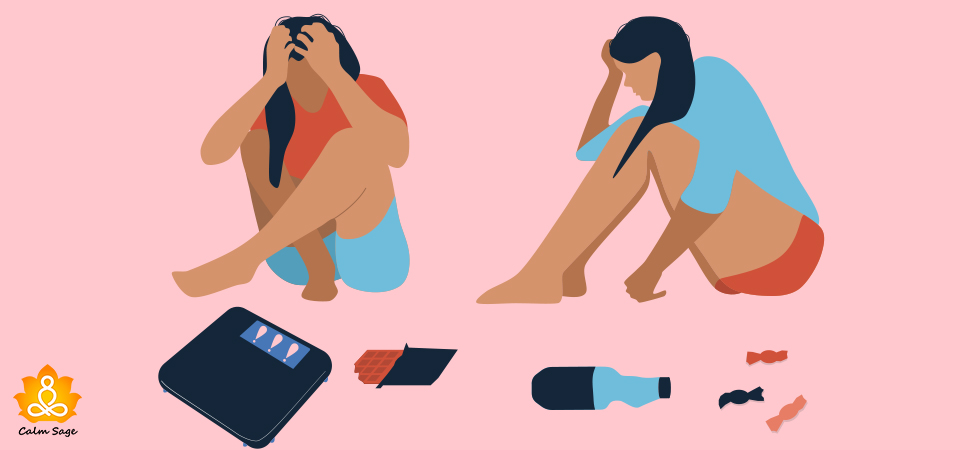Long Term Effects Of Bulimia Nervosa: Things You Should Keep In Mind
 Bulimia nervosa is a destructive eating pattern where the person overeats in a serious manner and then releases all the consumed food through vomiting or using laxatives. The binge-purge cycle may happen a number of times in a week and even more than once in a day. However, bulimia is not limited to this cycle but can be emotionally tormenting and may lead to life-threatening conditions while leaving long term effects on the human body.
Bulimia nervosa is a destructive eating pattern where the person overeats in a serious manner and then releases all the consumed food through vomiting or using laxatives. The binge-purge cycle may happen a number of times in a week and even more than once in a day. However, bulimia is not limited to this cycle but can be emotionally tormenting and may lead to life-threatening conditions while leaving long term effects on the human body.

It is important to note that binge eating and purging are not the only symptoms of bulimia nervosa but can show others like:
- Giddiness
- Constant mood swings
- Tooth decay
- Redness in eyes
- Puffy cheeks or facial swelling
- Throat swelling due to vomiting
- Blood in vomit
- Weak heart showing irregular heartbeat
- Compulsive exercising to control weight
- Lower sex drive
- Dry skin
- Damage in digestive tract
- Pregnancy complications
The overall damage to the metabolism puts a great strain on the body to function properly which ultimately leads to emotional stress. Research indicated that roughly 1.5% women will develop bulimia in their lifetime where 50% will recover in 10 years. However, about 30% of women can experience relapse of the disorder, causing long term effects of bulimia after recovering.
What Are Short Term Effects Of Bulimia Nervosa?
Apart from the symptoms mentioned in the list above, people suffering from bulimia can show signs like absence of menstruation or anemia which can lead to body fatigue. Dehydration, dryness in skin, constipation and changes in electrolyte levels could also be experienced. Cavities, gum problems, hair loss, organ failure and damage to internal organs are some other side effects of bulimia.
What Are The Long Term Effects Of Bulimia Nervosa?
1. Mental and Emotional Health (Central Nervous System)
 The person dealing with this disorder doesn’t feel disruption in their physical health alone but can also experience depression, anxiety, or obsessive compulsive disorders. This irritable behavior and mood swings could be due to lack of vitamins and essential nutrients. If you take an example then checking weight and monitoring of food becomes an obsession for them. Some of the individuals also get into substance abuse secretly in order to achieve ideal body weight. It all combines with stress, anxiety, guilt, embarrassment and shame while some of them develop suicidal behavior due to thoughts of unhealthy body image.
The person dealing with this disorder doesn’t feel disruption in their physical health alone but can also experience depression, anxiety, or obsessive compulsive disorders. This irritable behavior and mood swings could be due to lack of vitamins and essential nutrients. If you take an example then checking weight and monitoring of food becomes an obsession for them. Some of the individuals also get into substance abuse secretly in order to achieve ideal body weight. It all combines with stress, anxiety, guilt, embarrassment and shame while some of them develop suicidal behavior due to thoughts of unhealthy body image.
2. Physical Effects
1. Digestive System The digestive system of an individual dealing with bulimia nervosa is compromised leading to weak immune systems. Stomach pain, sore throat, high acid content and regular vomiting can cause damage to the mouth like tooth sensitivity, enamel erosion and gum diseases. The damaged intestine leads to bloating, constipation and diarrhea. In fact, the back of the hand is also injured when an individual induces vomiting by putting a finger inside the mouth. This phenomenon is known as Russell’s sign. 2 Circulatory System Purging can cause excessive dehydration ultimately leading to weak muscles and body fatigue. As a long term effect of bulimia, the chances of heart failure increases due to irregular heartbeat and weak heart muscles. This poor circulation can also lead to low blood pressure, weak pulse and anemia. If blood vessels do not hold up in a good condition then it may cause eyes to rupture. 3. Reproductive System Another symptom to identify long term side effects of bulimia is imbalance in hormones. The fatigue is so high that it can kill sex drive, may interfere in menstrual cycle or stop it altogether. Someone who is pregnant and dealing with bulimia nervosa can see complications like:
- Premature birth
- Miscarriage
- Gestational diabetes
- Maternal high blood pressure
- Birth defects
- Stillbirth
- Postpartum depression
- Breastfeeding issues
4. Integumentary System This sort of system comprises hair, skin and nails. Constant purging and dehydration in the body leads to overall dryness that causes frizzy hair and patchy skin. Chances of hair loss also increases due to lack of proper nutrition. With that, nails can also turn brittle and break.
Treatment Of Bulimia Nervosa
After learning about bulimia nervosa side effects, you must be willing to learn the treatment options for it. The goal of this treatment is to promote healthy relationships with food, treat nutritional needs and cope with unpleasant options. One can visit a doctor, mental health professional and nutritionist for diagnosis and treatment. If you are encouraging someone you love, make sure that you support them with love, patience and care. Participation of family and friends play a major role in eating disorder treatment.
Wrap-Up We hope that we have helped you in finding long term side effects of bulimia nervosa and you will be taking the right measures to help yourself or your loved ones. If we could help us in connecting you with a counselor today, drop us a message at info@calmsage.com.






